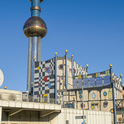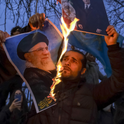Images of Turkish government advisors assaulting protestors in Soma have been suppressed by mainstream media © Depo Photos/ABACA/PA
What makes a free press? In the wake of the Leveson Inquiry and the phone hacking scandal, it’s a concept that has preoccupied many British journalists. I was working for News UK when the controversy was at its peak, and happened to be in the building when the tearful News of the World staff marched defiantly out of their newsroom for the final time. At the time I was torn between deep sympathy for the innocent journalists who had just lost their jobs, and deep shame at being part of a company associated with such gutter tabloid practices. That feeling of angst developed first into a brief career crisis, quickly followed by an abiding fascination with the question of press freedom and what can be done to best preserve it both at home, and abroad.
While we have made some progress in addressing those issues in this country, (new regulatory body the Independent Press Standards Organisation will come into being in June), a dispiriting new report reveals that the level of global press freedom has fallen to its lowest level in a decade. According to the research, carried out by the respected American watchdog Freedom House, 44 per cent of world’s population live under a press that is “not free”, while only 14 per cent enjoy the benefits of a fully free media.
Among the nations leading this decline is Turkey which has slipped into the “not free” category alongside the likes of Ukraine and North Korea. Despite the recent repressive behaviour of its Prime Minister Recep Tayyip Erdogan who shut down Twitter and YouTube in the run-up to recent local elections, this initially struck me as a rather draconian judgment. But, after journeying to Istanbul and learning of the tough conditions in which my fellow scribes are forced to operate in a nation which is best described as an “illiberal democracy”, I now fully support this judgment.
The world urgently needs to wake up to the plight of the Turkish press—it is the world’s leading jailer of journalists—there were 40 behind bars in December 2013, although that is reported to have now fallen to 18. Where is the global outcry? When Al Jazeera journalists are held on charges of supporting terrorism in Egypt, it makes headlines around the world but in Turkey there is silence. None of the nation’s mainstream media will dare to tell their stories for fear they will either meet a similar fate, or at best lose their jobs. State censorship of news organisations, mass firings, imprisonments and wiretapping of journalists are reportedly rife. “I have had so many court cases opened up against me I’ve lost count,” said the Editor in Chief of one of Turkey’s leading English-language newspapers who asked to remain nameless. “I am being sued by the government, the intelligence services, I don’t remember who else. But I am not afraid, if they want to me put me in prison, they will—that’s how things work in this country.”
One of the most engaging ideas to emerge from two days of heated debate on issues around press freedom was a proposed campaign to “adopt a Turkish journalist.” Put simply, leading publications around the world would give a voice to those who have been banned from working in their homeland and raise awareness of the woeful state of the Turkish press. “Former colleagues of mine have been forced out of their jobs and are unable to pay their rent or feed their families,” said Amberin Zaman, The Economist’s Turkey correspondent who is married to an American diplomat. “I have helped them out as much as I can, but there’s only so much I can do on my own. The international community needs to show solidarity.” She wants to see major titles such as The Guardian and Germany’s Die Welt take these journalists on as freelance Turkey correspondents, helping to keep the story alive and put a human face on this tale of political woe. A journalist is for life, not just one big story, if you like.
The Turkish government refuse to acknowledge that any criticism of their media might be valid, dismissing the Freedom House report as a politically motivated attack, and criticising it for listing Israel as the freest country in the Middle East. “[This report] is nothing but a comedy… Those who say that there is no press freedom in Turkey should just take a look at the headlines of the daily newspapers. A significant number of the 40 daily newspapers insult the government systematically,” the Prime Minister stressed. When it comes to the issue of the jailed journalists, the government is equally obtuse, claiming that only five of those imprisoned are “proper journalists”, as the rest are not in possession of a state-issued press card. Many of those targeted have been imprisoned on terrorism charges which stem from the fact they work for Kurdish media organization and are suspected of using journalism as cover for their political activities, one such editor Omer Celik of the Dicle News Agency, faces up to 15 years imprisonment on charges of “acting under the orders of a terrorist organisation.”
The civil unrest in Istanbul last summer sparked by plans to redevelop the city’s famous Gezi Park, exposed the culture of intimidation and self-censorship which surrounds the Turkish press. A total of 72 journalists were either fired or forced to take leave from their jobs after attempting to report the true scale of the protests. The Turkish version of CNN famously broadcast a nature programme about penguins, while CNN international showed scenes of violence spreading across the country.
“We are now facing a new period where the media is controlled by the government and the police and where most media bosses take orders from political authorities,” The head of the CHP, Kemal Kilicdaroglu, told international reporters in the wake of the violence. “A period where stories approved by political authorities are published and those that aren't are censored.” The level to which this culture has taken root was highlighted earlier this week in the coverage of the tragic mine disaster at Soma. While there has been widespread popular criticism of the Prime Minister’s callous response to the disaster, enhanced by footage emerging on social media of Erdogan allegedly punching a protester during a visit to the grief-stricken city, none of Turkey’s pro-government papers carried any images of the incidents. The footage is inconclusive but has featured on major news websites worldwide.
There are some positive signs, after I returned from Istanbul the news broke that five jailed journalists who had worked for pro-Kurdish news outlets had been released. Whether this is partly a response to rumours that the EU is likely to freeze Turkey’s long-standing membership application over Erdogan’s increasingly autocratic style, we can only speculate. “The arbitrary way in which these journalists have been released, exposes the fact that they were probably detained in an equally arbitrary fashion,” says Amberin Zaman. “But, it’s clear that the government does respond to pressure from the EU, after all their image was originally built on being pro European and democratic.”
"Turkey is taking the right steps toward bringing its press freedom record in line with democratic standards, but more needs to be done," said the Committee for the Protection of Journalist’s Deputy Director Robert Mahoney. "Turkish authorities should remove the travel bans imposed on the journalists, drop all criminal charges, and release all other journalists behind bars in the country."
If a strong journalistic culture continues to be suppressed in Turkey, it could prove devastating to the country’s fragile democracy and economic prosperity. But, with Erdogan set to run in (and most likely win) the nation’s inaugural presidential elections in August, there is the prospect of another decade of his increasingly authoritarian leadership. Although the true nature of the President’s role is yet to be defined, it is still a deeply worrying prospect. “There are some figures within the government who would like to bring back democratic principles, including freedom of the press, “ claims Amberin “but it is impossible when you have a Prime Minister who behaves so erratically.”












